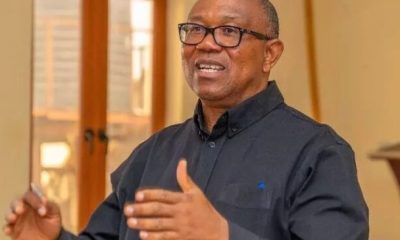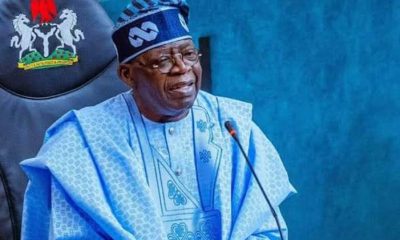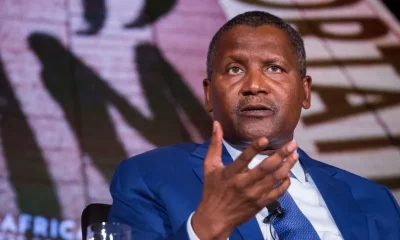Former Governor of the Central Bank of Nigeria, Sanusi Lamido Sanusi, on Saturday, questioned the volume of Nigeria’s daily consumption of Premium Motor Spirit, also known as petrol.
Sanusi described as unbelievable the claim by the Nigerian National Petroleum Company (NNPC) Limited that Nigeria consumes 66 million litres of fuel daily.
“Are we drinking the petrol?” the former governor of the apex bank queried the “inflated” figure when he delivered a keynote speech at the seventh edition of KadInvest, an annual event organised by the Kaduna State Investment Promotion Agency.
Sanusi lamented the bogus amount spent on subsidy payment annually, and demanded that the NNPC be unbundled and disbanded, noting that the company should not continue as a cash cow for a few Nigerians.
He blamed the lack of revenue in the country on what he called the subsidy free-for-all.
Former Central Bank of Nigeria, Lamido Sanusi, at KadInvest on Saturday. Credit: Twitter/@Kabirusalisu_
“NNPC tells us officially that we are consuming 66 million litres per day…We are consuming more than Indonesia, Pakistan, Egypt, Cote d’Ivoire, more than Kenya.
“In 2019 officially, we were importing 40 million litres per day. In 2022, officially, we are importing 66 million per day. In three years, we have increased our petrol consumption by 50%. Please tell me, is it the population? Is it the number of cars? Just ask yourself if it makes sense that in three years you increase your consumption of petrol by 50%,” he said.
Continuing, Sanusi said, “Nigeria has continued to be a rentier state. It does not exist for development but as a sight of rent, and extraction to make those who control the state rich to turn them into billionaires overnight.
He noted that Nigeria can’t keep pushing the brink but must come back and address the issues at hand so that future generation won’t suffer.
The ex-CBN governor, who cited a data from the Federation Account Allocation Committee, said only 50% of states generated enough recurrent revenue to cover their wages, overheads and debt services.
He said the cost of servicing debt in Nigeria with the Federal Government for the first half of 2022 was N2.597 trillion whereas revenue was N2.4 trillion.
“In other words, debt service is now 108 percent of revenue. Every naira the Federal Government earns goes to service debt and it is not enough, it has to borrow to service the debt, and then begin to pay salaries, borrow to pay overheads, borrow to build roads,” he said.
“Let me ask you: what do you think we are leaving our children behind (with)? A mountain of debt. Every generation wants to leave a legacy so that our children and grandchildren will be praying for us and ask God for mercy on us, not cursing us.
“You leave them with a mountain of debt, you have not educated them, money that will should put into their education, into their healthcare, even assuming this fuel subsidy is genuine, we have taking that money to give ourselves cheap petrol. We are borrowing to enjoy cheap petrol so that our children will oay that debt.
“We see the problem and we are going to continue. I’m sorry for the next president who comes in June and says I’m removing fuel subsidy on day one. I don’t know what kind of political stability you’ll have,” Sanusi stated.
At the event on Saturday, President Muhammadu Buhari was represented by the Minister of State, Industry, Trade and Investment, Maryam Katagum.
Africa’s richest man, Aliko Dangote; and the presidential candidate of the All Progressives Congress, Bola Tinubu; were also present as well as Governors Nasir El-Rufai (Kaduna), Abubakar Bagudu (Kebbi), and Abubakar Badaru (Jigawa).

 Privacy5 years ago
Privacy5 years ago
 News5 years ago
News5 years ago
 Entertainment4 years ago
Entertainment4 years ago
 News5 years ago
News5 years ago
 Opinion5 years ago
Opinion5 years ago
 News5 years ago
News5 years ago
 Sports4 years ago
Sports4 years ago
 Entertainment4 years ago
Entertainment4 years ago















